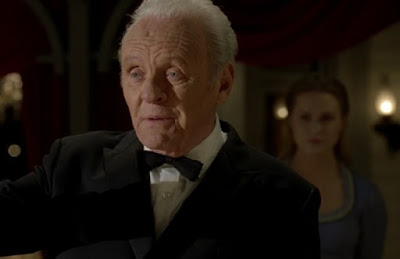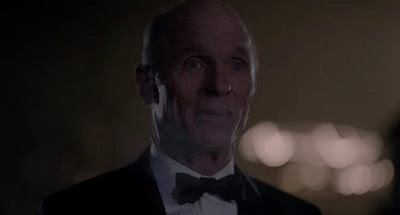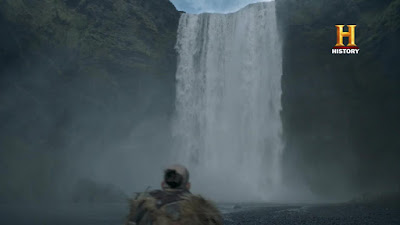Storytelling is a funny thing. "There's nothing new under the sun." has long been a cliché among writers of all types. No matter how original you think your material is, chances are it's been done before in some way, shape, or form. I've mentioned Joseph Campbell's "hero's journey" many times when writing these reviews, because there are some elements of that basic narrative that heroic fantasy (note the label) will never escape. Certain aspects of the story are going to happen because cultural expectations are present, especially when dealing with a mass audience like Game of Thrones, as opposed to a niche fanbase like, say, HP Lovecraft. The protagonists die and the monsters from beyond space and time win all the time in Lovecraft's stories. It's part of what makes them interesting to those of us that are fans. (Or have
written the
stuff.)
George RR Martin seemed to turn some of the usual trope on its head by being willing to sacrifice major characters, like Ned Stark. It's part of what gave both the books and the show their appeal, since much of the audience came to believe that Martin was willing to kill anyone (which isn't really true, but let's not get into that.) Consequently, there was no rote function in terms of the heroes of the story: meets challenge, defeats challenge, wins girl and kingdom, etc. For that matter, the story was written such that the "heroes" were often hard to define or even find. That's what always had the greatest appeal to me. I hate the Black Hat/White Hat syndrome. I want Gray Hats. I want humans. Give me The Wire or Breaking Bad or Joe Abercrombie's
First Law books any day.

But at some point, as the writer, you have to ask yourself the question: Am I writing a story simply to defy the stereotypes/traditions or am I writing it because these characters have something to say, even if what they say is stereotypically "heroic"? Was Jon Snow always going to be the recipient of the orphan's destiny ("Your parents abandoned you... but you're really the heir to the throne of a kingdom!") or was that something that just worked out when it came to the tragedy of Ned's secret and Robert's Rebellion being based on a lie and Robert's enormous ego? I've complained multiple times this season about moments that I felt were fan service. They either weren't really crucial to the story but part of the audience would get a charge out of them (Arya slaughtering the entirety of House Frey) or they were crucial to the story but still feel like rote "heroic" stuff (Jon and Dany, the two most non-gray of the main characters, falling for each other.) Did Martin, the supposed standard bearer for writers that shock and surprise their readers, intend for many of his complex storylines to blossom into a "happily ever after" presentation? (Obviously, it's not over yet, so a lot could change.)
Or does some of this feel like fan service simply because the story's been in progress for 20 years? Martin has grumbled before that fans have long since figured out the clues to many things that he's dropped into the books, mostly because the gaps between said books have grown so long that fans have little to do but pore over every detail. So, even if it wasn't something typical like the orphan's destiny, people likely would have figured out the different tack being taken and it might feel just as tired as this kinda does. Or is it just me and those of us who really pay attention to these things? I have a couple characters from a post-apocalyptic setting that I wrote many of my comic scripts in, named Jekyll and Hyde. They're a couple of mercenaries and those names are really nicknames for them, but it's how they're identified. That's something you can do more easily in the comics medium, where certain things are acceptable when they're "meta". But a friend read one of my scripts years ago and told me: "You can't use those names. They're too obvious." But are they?

I've read Robert Louis Stevenson's novella. That's part of why I chose to use those names for those characters. How many modern readers can say the same? For that matter, how many of the generation currently watching Game of Thrones could give any detail of what the
Strange Case of Dr. Jekyll and Mr. Hyde is actually about? Would those names be too obvious to them? Or would they kinda get the reference, as I originally intended, and move on? Similarly, am I too critical of the fact that Jon Snow's life is kind of playing out like a fairy tale or is it OK, since the majority of the fanbase are probably thrilled that one of the real heroes is getting the payoff that they've long expected? (This is why test audiences exist, after all.) This is part of why Jaime and Sandor Clegane have long been my favorite characters, largely because they're NOT typical and have followed a path that wasn't easily predicted and still isn't. Those are humans (albeit, highly cynical ones, which is also part of the appeal) and they've reacted to their changing circumstances by acting like humans.
I'm not a happy ending guy. I don't find them interesting. And, in truth, there's nothing that guarantees that what's coming up next season will have a happy ending. So, perhaps the problem isn't how things are coming to an end, but that they're ending at all and everything that most of the fanbase has predicted is coming true. Is it disappointing that the story is playing out as expected? Would people be more excited with another twist? Or would it feel like the writers were dodging simply to get that twist in? Let's take Littlefinger as an example. I long expected that the instigator of the current war would survive until the end, simply because that's what Littlefinger does: he survives, usually by working the edges of a situation. But last night, his story came to a close in one of those moments that I'd often refer to as "fan service". Sansa got her revenge and one of the characters that much of the audience loves to hate was executed for his actions. I'm sure that a good chunk of the audience feels content with that (relatively) happy ending. If Littlefinger had escaped yet again, there might have been some frustration. To me, a debatable story point like that is a positive thing, even if it didn't turn out the way that I anticipated.

In contrast, something like the Hound's confrontation with the Mountain was fan service to the extreme. In the midst of a highly uncomfortable truce meeting, the Hound chooses that moment to remind not only his brother, but the audience of the impending showdown between the lords of House Clegane, as Sandor intends to take revenge for the scars that we see on his face every time he's on camera. There's no acknowledgement of what's taking place around them; no mention of the fact that his brother is basically an undead construct (not too different from what's released from the crate a few minutes later). It's just time for a 1950s Western standoff on Main St., with as much testosterone as possible. I watched that and thought: Wouldn't that have been just as effective with a couple brief shots of the Hound's face, glaring at his brother? Or did Benioff and Weiss feel that the audience needed the melodrama?
On the other hand, in contrast to both of those, there were some moments that didn't play out according to expectations, but still demonstrated a firm grasp of character on the part of both the writers and the actors. Sansa and Arya assuming the role of masters of Winterfell, even though they'll never be as comfortable with each other ("Well, don't get used to it. You're still strange and annoying.") as Jon and Arya, the two outsiders, is a great example of letting the characters blossom into roles that most probably didn't expect but which now seem perfectly natural. Similarly, with Jaime finally making the break from Cersei, the latter has finally been left alone with all of her monsters, internal and external. It's how she's always felt and what her actions would inevitably lead to as she strove to take the place that she knew should have been hers ("But I listened. I learned.") By the same token, Jaime finally came to grips with the fact that his maturation and sense of ethics simply can't allow him to stay, no matter how much he loves his sister and their impending child. Among many storylines that seem rote or obvious, that's one that still intrigues me, as watching someone struggle with those basic moral and emotional conflicts is, in the end, what real storytelling is all about.
Technical stuff:

You can see the points where what was going to be the final season (this one) got stretched into two seasons, at HBO's request. There have been several instances in this season of characters doing the reunion thing (Winterfell, the expedition past the Wall, etc.) and last night was no exception. The meeting in the Dragon Pit led to several acknowledgements of time apart and the changes that had taken place in the interim. While most of these were interesting character moments (the conversations during the hike beyond the Wall being one of the highlights of that episode, for example), they just bordered on the tedious. We know that these people could tell each other interesting stories about where they've been and what they've done, but we've seen those stories. But, again, when you're wrapping up what's going to be an eight-year epic, I suppose there's some room for the characters to stop and look around at what's happened to all of them. The little smile shared between the Hound and Brienne was a particular high point here.
Speaking of character moments, there were some excellent ones in the meeting between Tyrion and Cersei. The best part was Tyrion deciding to do the courteous thing and offer his sister some wine. Never was more weight added to the simple action of the placing of a wine glass, as Cersei looked at it with the venom of someone who still suspects her brother of the murder of her son and Tyrion placed it with the mixed emotions of someone offering it in the spirit of trying to come to an agreement for all their sakes and yet still getting in a little jab at the person who unjustly accused him and caused him so much other anguish. That was a moment to savor, for certain. Similarly, Dany and Jon setting up the pleasure cruise in the strategy room while Jorah grits his teeth and everyone restrains themselves from rolling their eyes was quite funny. I was half expecting Tyrion to burst out with something like: "Yes, wonderful! Can the two of you stop thinking with your loins while we plan our grand strategy?"

There were also many little reflections on some of the ongoing tensions, like the undercurrent of resentment and awkwardness between Cersei, Jaime, and Brienne on the dais. But there have been several of those in terms of remembering back to the little moments that made up the basis of the story, as Arya and Sansa remembered their father's words about the survival of the pack over the lone wolf; as Tyrion recalled his offer to Bronn when they first met, doubling whatever "they" would offer; and, of course, the trial of Littlefinger, going back to the very root of the conflict that initiated the human story (as opposed to that which involves the Others.) As much as it disappointed me to see Lord Baelish depart the play, I have to say that that scene was exceptional. The highlight was Sophie Turner's performance. I said years ago that much of the audience's distaste for Sansa's character was making them miss the remarkable facets of her role and Turner's skillful handling of its nuances. She's been excellent.

On the downside, I'm not sure that Theon's role in this is really worth highlighting any longer. As much as I continue to appreciate Alfie Allen's performance in a difficult role, I think there are other ways to continue the redemption of Theon that don't involve having to drag a subplot off to the Iron Islands in the remaining seven episodes that the series has. It doesn't appear that Euron is going to be as instrumental as he is suspected to be in the books so, just like Dorne, it would seem to make sense to sideline the Greyjoys in favor of focusing on the real war and all of the turmoil that will surround it. Speaking of which, I have to say that I was disappointed in Conleth Hill's screen time this season. Varys has been instrumental in the plot and Hill's scenes with Tyrion and others are always a delight and we got very little of that this time. I would have thought that the grand truce meeting would have been prime territory for him and, despite his significant time on camera, he had zero dialogue. That's unfortunate but, again, seven episodes, shortcuts, condensing, etc.

Oh, yeah. The ice dragon/dracolich thing. I think it was handled well. I don't know if Martin intended that a dragon was the way to get through the Wall (guess we'll find out when that next book is done, right George? George...?), but that would presume that the Night's King is also a greenseer of some kind and can, unlike Bran, predict the future and know that dragons would not only be reborn into the world, but also that they would be brought to him. That seems to indicate a bit more power than just being one of the weapons the Children created and then lost control of and, of course, that's true, since the Night's King was a human member of the Night's Watch before becoming what he is now. It's quite possible we'll never know the answers to that, which is fine, since giving away all the lore is kind of boring and not doing so leaves the fans something to speculate on (and, of course, request prequels for.)
The flip side of that is the lengthy recap as Sam and Bran sussed out the reality of Jon's (Aegon's) heritage. That's one of those situations where you have the characters trying to catch up with the audience, which I don't always find especially useful because you risk having some viewers wishing they'd get on with it because everyone knows this already. Also, in telling Jon the truth, you have little to go on but the word of a mystic in a wheelchair. Similarly at Littlefinger's trial, only the shock value of Baelish reacting to hearing his own words given back to him (and the fact that most of the lords of the Vale didn't like him) "proved" anything. In some cases, you're just hoping the audience rides the ride and doesn't ask too many questions (just as with the history of the Night's King) and that's fine. That was a fine scene, regardless, with the little nuances of two of the more honest and straightforward characters in the entire story. ("I have no idea what that means.")
Lines of the week:
"I still enjoy it when they call me 'milord'."
"The thrill will fade."
Take it from someone for whom a lot of thrills have faded.
"Why would anyone want to live that way?"
"There's more work in the city. And the brothels are far superior."
Tyrion, social and sexual pragmatist.
"Now, thanks to me, she's got two traitors' heads walking right through her door and she can lock them up as soon as she gets tired of the clever words that pour out of their pieholes."
Ser Bronn of the Fucking Blackwater. I'm glad they kept him around.
"Seems every bad idea has a Lannister cunt behind it."
Likewise, the show was a little more boring without the Hound.
"I can't have children."
"Who told you that?"
"The witch who murdered my husband."
"Has it occurred to you she might not have been a reliable source of information?"
So, this is the thing: Has she actually been trying to have children? Likely not, but after months with Daario, the thought of how birth control is accomplished in the world of Ice and Fire comes back to the fore. Yes, there's 'moon tea', but did Dany have a keg of that sitting around the pyramid? Wouldn't that raise a few questions?
"I never trust godly men."
Historically, not an unwise habit. There's other agendae and occasionally even nasty morals that get in the way. Whatever else you can say about him, Petyr Baelish was no dummy.
"My sister asked you a question."
In the running for the winner just because of the way this was delivered. Ice cold.
"Thank you for all your many lessons, Lord Baelish. I will never forget them."
Similarly, this was awesome.
"I remember everything."
You must be a book reader...
And the winner:
"When enough people make false promises, words stop meaning anything, and there are no more answers. Only better and better lies."
Welcome to modern politics, 2017. This rang so true that apparently even Scaramucci was tweeting it last night.























































